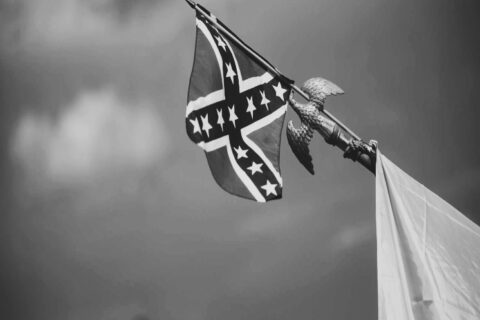Hereby it is manifest that during the time men live without a common power to keep them all in awe, they are in that condition which is called war; and such a war is of every man against every man . . . In such condition there is no place for industry, because the fruit thereof is uncertain: and consequently no culture of the earth; no navigation, nor use of the commodities that may be imported by sea; no commodious building; no instruments of moving and removing such things as require much force; no knowledge of the face of the earth; no account of time; no arts; no letters; no society; and which is worst of all, continual fear, and danger of violent death; and the life of man, solitary, poor, nasty, brutish, and short.
Thomas Hobbes, Leviathan, Book I, Chapter 13, “Of the Natural Condition of Mankind as Concerning their Felicity and Misery”
I would assume a great many readers of this blog are, at least, somewhat familiar with Thomas Hobbes and his tome Leviathan; additionally, most semi-educated Americans have a cursory understanding of the great Hobbes v. Locke debate. The purpose of this entry is not to spur on discussion on the ideal system of government within the context of Hobbes v. Locke, although such a commentary would likely produce an interesting discourse between monarchists, democrats, authoritarians, and republicans (the systems of government, not the American political parties). Rather, this modest submission will explore Hobbes’ position on “man,” or the nature of man or “State of Nature,” with that of the American normie.
As for Southern Nationalists, particularly those invested in the history of the English Civil War, it should be noted that Hobbes’ father was an Anglican vicar. Conversely, Locke, the ever sentimentalist, was raised in a Puritan household. That should not come as a surprise to the Southern Nationalists that have an accurate disdain for the Puritans. Hobbes is also connected with William Cavendish, King Charles I’s financier during the Civil War, and temporarily the tutor of Charles II. In short, the Hobbes family were staunchly royalists, as are many modern Southern Nationalists that have studied history and the great crimes of Oliver Cromwell.
Per Hobbes, the “State of Nature” was/is a state of perpetual conflict, fundamentally a disordered, power struggle whereby mankind grapples with itself over finite resources and, most importantly, power. Moderns, especially normies, may find this a rather dim and cynical view of the world, but I would wager, and for most rightwing dissidents, this is an accurate understanding of the world. The act of forming a polity, in Hobbes’ opinion, was an effort to restrain this cycle of conflict, in which the people collectively adhere to a stronger power (and/or belief) than their own. Hobbes formed this view from two critical influences. The first was the English Civil War. The devastation and widespread cruelty incurred from that conflict was far worse than any depravation that could be produced by House Stuart (again, per Hobbes). It should not be neglected that such a position is similar to a popular Dissident Right aphorism from Wrath of Gnon, “A bad Democracy can only be redeemed in a sea of blood: a bad Monarch can be redeemed by a drop of poisoned wine.“
The second influence comes from Thucydides, of which Hobbes wrote the first English translation (1629) of his work, The History of the Peloponnesian War, regarding the conflict between Sparta and Athens. Despite their superficial appeals to virtues and abstractions, it was Thucydides’ outlook that individuals and polities were simply shrewd and, ultimately, self-serving. Again, members of the Dissident Right will quickly pickup on an instrumental line from Thucydides, “right, as the world goes, is only in question between equals in power, while the strong do what they can and the weak suffer what they must.”
Moderns have criticized Hobbes’ “State of Nature” as overly cynical and jaundiced. This, of course, derives from contemporary, mass-produced egalitarian thinking and belief systems. In today’s age, we are routinely instructed that might, in fact, does not make (it) right. From a moral, traditional, and Christian perspective, this is certainly true. Just because antifa rioters used their “might” (being generous, it was a controlled, domestic Color Revolution) to destroy American and Southern monuments, this does not make such behaviors “right.” That being said, the nature of reality holds that “the strong do what they can and the weak suffer what they must.” Just ask the lion and the gazelle. Additionally, normies have been brainwashed into accepting both the belief in the tabula rasa theory and that man is, generally speaking, good, decent, and desires life, liberty, and the pursuit of happiness. Normies accept these fanciful abstractions, even far more ludicrous ones (i.e., mass equality), while simultaneously rejecting Hobbes’ observation about man’s own selfish nature.
Hobbes can provide us with insights into the nature of man, or that of the normie. Hobbes believes that the vast majority of mankind “shun death,” and that the desire to preserve their own lives (and comfort) is incredibly strong in most. While normies have limited affections, their kindness is actually quite restricted in reality and usually discarded in the face of any potential disruption to their power or safety. Concerned that others should agree with their own high opinions of themselves, normies are very sensitive to insults or damage to their reputations. According to Hobbes, normies are curious, if only superficially, about the causes of events, and fearful about their futures (preservation).
Of course, I am singing to the collective choir here, but I believe there is little doubt that Hobbes is correct in his position on mankind, or timelier, normiekind. Self-interest will always be the primary focus of a people without belief, particularly with Christianity in retreat. Also, there is no Hobbesian “awe” for the people – there is only fear; the fear of retribution to standing up against the progressive order. With Christianity in the West in deep, severe decline, normies have either the fear of a punitive response or compliance to the West’s new secular doctrine. Since self-preservation is the driving force of the normie, is it any wonder that most sacrifice even their own families on the altar of neoliberalism? The examples are countless and equally unfathomable to traditionalists.
Jackson Reffitt turned in his own father to the FBI for the January 6th debacle. Despite never entering the Capitol, he was sentenced to 7 1/4 years in prison. Per CBS News, the FBI arrested dozens of people based on tips from their own family members, work colleagues, and childhood friends who called authorities after watching them participate in the J6 protest. We can observe the historical record, too. By the time East Germany collapsed, the Stasi employed 91,015 employees and 173,081 informants. About one out of every 63 East Germans collaborated with the Stasi. By at least one estimate, the Stasi maintained greater surveillance over its own people than any secret police force in the history of the world. With self-preservation as the primary, animalistic decision-maker for the normie, we can understand the true motivations of our neighbors as the West collapses in front of our eyes.
Why is that? Unfortunately, I think Hobbes has the answer to the Normie Question.
-By Aristocrotis

O I’m a good old rebel, now that’s just what I am. For this “fair land of freedom” I do not care at all. I’m glad I fit against it, I only wish we’d won, And I don’t want no pardon for anything I done.






The last British monarch to play a role in the government of the country was William IV, the uncle of Queen Victoria. The British Monarchy is purely a ceremonial institution. QE II had about as much control over immigration into the UK as you have over immigration into the US, which is to say, none.
Indubitably I say … as we “talk” … and sip tea with pinkies out …
https://www.reuters.com/world/us/migrant-caravan-mexico-heads-us-border-americas-summit-starts-2022-06-06/
The Yank’s your cousins are not your enemy! If we divide and civil war is started your enemy will call in the oriental commies to help quell it, and you cousin will be enslaved … history will be an inverted rhyme: https://odysee.com/@ResistanceRadioJeffreyDaugherty:e/revelation-is-revolution:8
I’m talking chattel slavery they already put you in debt slavery after the first engineered “civil war”!
This is really an interesting and insightful piece, and I have to confess an ignorance of Hobbes’ thinking. I’ve read Robert Filmer and Algernon Sidney, but I got the sense in reading your piece that I’ve been missing something in not investigating Hobbes as well. I might class myself as a ‘recovering normie’.
It may surprise you though to know that most of the Southern Nationalist speakers I’ve listened to cast Hobbes and his Leviathan in a very negative light.
We’re all “recovering normies” if we’re honest with ourselves; some of us might even denominate ourselves “recovering leftists,” but that would be going way too far for many of us, including yours truly. I know quite a few “recovering leftists/marxists” who are in the process of recovering from several leftist/marxist principles that I, for one, have never adopted or even entertained as truthful in any way, shape or form. A good upbringing in a good Christian home is key to all of this.
I had that good Christian upbringing of which you write, but to my shame I didn’t always appreciate it. I always abhorred leftism and Marxism, but was for a time drawn into the false paradigm of the two party system in America before coming to the realization that they were both co-opted by international finance. By the grace of God I can’t remember that I ever did buy into the Yankee version of the WBTS.
Great article, many misunderstand the difference between Might makes right and Might is right. who ever holds authority controls the morality of the society, and as schmitt says “Sovereign is he who decides on the exception.” and that is how we can tell who is in power vs who isn’t. the ethnocracy we are under show’s us time and time again who gets away with crimes and who doesn’t. eyes on the small hat’s and their golems.